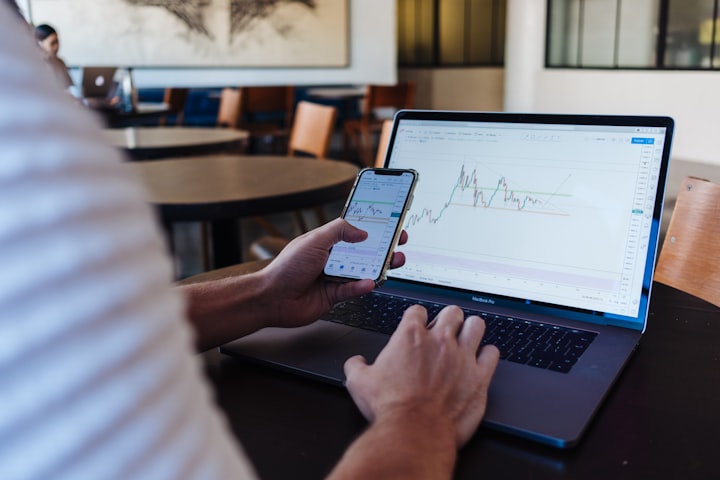Best Tips to Start Forex Trading in Canada
The basics of how the market works, the different types of currencies you can trade, and the risks involved.

The foreign exchange market, also known as forex, is one of the most exciting and dynamic financial markets in the world. In Canada, it is a popular way for people to invest their money and potentially make a profit. However, forex trading can also be risky if you don't know what you're doing.
In this article, we will provide a beginner's guide to forex trading in Canada. We will cover the basics of how the market works, the different types of currencies you can trade, and the risks involved. We will also provide some tips for getting started and making the most of your forex trading experience.
By the end of this article, you will have a good understanding of the basics of day trading in Canada and will be able to make an informed decision about whether or not it is right for you.
So, whether you are a complete beginner or just looking to brush up on your knowledge, this is the article for you. Let's get started!
Is Forex Trading Legal in Canada?
Yes, forex trading is legal in Canada. But, it's important to understand that the market is heavily regulated to protect investors.
Here are some key considerations for traders to ensure compliance:
Each Canadian province has its own securities commission that regulates forex trading, meaning there are specific rules and requirements that vary slightly depending on where you live.
All forex brokers operating in Canada must be members of the Canadian Investment Regulatory Organization (CIRO), which ensures certain standards and are subject to ongoing oversight.
Individuals offering forex trading services must also be registered with their provincial securities commission.
Forex Trading in Canada: Understanding the Basics
1. Forex Market Overview
The foreign exchange market, or forex for short, is a global marketplace where currencies are traded. Imagine it like a giant bazaar where people from all over the world come to buy and sell different currencies, just like you might exchange dollars for euros when traveling abroad.
How it Works
24/7 Trading: Unlike stock exchanges with set hours, forex operates continuously, 24 hours a day, 5 days a week. This means you can trade currencies whenever it's convenient for you.
Currency Pairs: Currencies are always traded in pairs, like CAD/USD or EUR/JPY. The first currency is the "base currency," and the second is the "quote currency." The price you see represents how much of the quote currency you need to buy one unit of the base currency.
Supply and Demand: Just like any market, currency prices fluctuate based on supply and demand. Economic news, political events, and global interest rates can all influence how much people are willing to pay for a particular currency.
Making Profits: Traders try to profit from these fluctuations by buying currencies they believe will rise in value and selling currencies they expect to fall. They can do this by holding the currencies for a short or long period, depending on their strategy.
Bid and Ask: Just like any market, there are buyers and sellers in forex. The "bid" price is the highest price someone is willing to pay for the base currency, and the "ask" price is the lowest price someone is willing to sell it for. The difference between these two prices is called the "spread," which is the broker's fee for facilitating the trade.
Going Long or Short: When you think a currency will rise in value, you "go long" by buying it. If you think it will fall, you "go short" by selling it. You can then close your position later by selling (if you went long) or buying back (if you went short) the currency, hopefully at a profit.
2. Currency Trading in Canada
Major Currency Pairs
Some of the most commonly traded currency pairs include:
EUR/USD: Euro against the US dollar
USD/JPY: US dollar against the Japanese yen
GBP/USD: British pound against the US dollar
CAD/USD: Canadian dollar against the US dollar
AUD/USD: Australian dollar against the US dollar
For Canadian traders, there are some unique aspects of the forex market to consider:
The Canadian dollar, nicknamed "Loonie," is a major commodity-linked currency. Its value is heavily influenced by the price of oil and other commodities, as Canada is a major exporter of these resources.
The Bank of Canada sets its own interest rates, which can differ from those of other countries. These differences can affect the attractiveness of the Canadian dollar and create trading opportunities.
As mentioned before, forex trading in Canada is heavily regulated by the Canadian Investment Regulatory Organization (CIRO) and provincial securities commissions. This ensures a safe and fair trading environment for Canadians.
OVerall, Forex trading is complex and risky, you have to do your due diligence and understand the risks involved, and start with a small amount of money until you gain experience.
How to Start Forex Trading in Canada
So you're interested in trading forex in Canada? You're not alone!
The forex market offers exciting potential, but it's important to navigate it carefully. This guide will equip you with the essential steps to get started with forex trading in Canada the right way.
1. Selecting a Forex Broker
Your first crucial step is selecting a reliable and reputable forex broker authorized to operate in Canada. Here's what to look for:
Regulation: Ensure your chosen broker is registered with CIRO, the Canadian regulatory body for forex trading. This guarantees they meet strict standards and operate with integrity.
Experience and Reputation: Choose a broker with a proven track record and positive reviews from Canadian traders.
Competitive Fees and Spreads: Compare fees and spreads offered by different brokers. Lower fees and tighter spreads mean you keep more of your profits.
Platform Options: Choose a broker offering a platform that suits your needs and trading style. (More on platform options later!)
Customer Support: Reliable and responsive customer support is crucial for troubleshooting and guidance.
IFC Markets may be worth considering as they tick many of these boxes. They are regulated by CIRO, have been around for over 30 years, offer competitive fees and spreads, and provide access to popular platforms like NetTradeX. However, always thoroughly research and compare multiple brokers before making a decision.
3. Understanding Trading Platforms
Your trading platform is your window into the forex market. It's where you analyze data, place orders, and manage your trades. When choosing a platform, consider:
User Interface: Choose a platform with a clear and intuitive interface that's easy to navigate, especially for beginners.
Features and Tools: Look for a platform with features that match your trading style, such as charting tools, technical indicators, and risk management tools.
Compatibility: Ensure the platform works on your preferred devices (desktop, mobile, etc.).
NetTradeX from IFC Markets is a popular choice for its user-friendly interface, advanced charting tools, and comprehensive risk management features. Again, test out different platforms and find one that feels comfortable and efficient for you.
4. Creating a Trading Plan
Before placing your first trade, create a trading plan that outlines your strategy and risk management. And don’t forget about consistency, meaning you will need to try to use a consistent set of rules that will give you a statistical advantage and then exploit that advantage overtime.
Conditions - review the price chart, identify trends and support/resistance levels, apply indicators, see for confluence.
Entries - then look for chart patterns like, double bottom (top), or head and shoulders (reverse) or candlestick patterns, like engulfing, 38.2 candlestick for entry points.
Stops - use stop loss below resistance or support + 1 ATR
Targets - reward risk ratio varies from one situation to other, yet there is a tested ratio that works well - R/R 1/1.4.
Also important question you will have to answer for yourself
Your Trading Goals: What do you hope to achieve through forex trading? Are you aiming for short-term profits or long-term wealth building?
Risk Tolerance: How comfortable are you with potential losses? Determine a maximum acceptable loss amount per trade and stick to it.
Money Management: Allocate a specific amount of capital to forex trading and never risk more than you can afford to lose 1 or 2 %.
A well-defined trading plan is your roadmap to success in the dynamic forex market and by choosing a reliable broker, understanding your trading platform, and creating a solid trading plan, you'll be well on your way to starting your forex trading journey in Canada.
Trading Forex in Canada: Tips for Success
Here are 5 concrete steps to turn your aspiration into success
Open a Demo Account: Before touching real money, familiarize yourself with the ropes. Most brokers offer free demo accounts with virtual funds. Use this sandbox to:
Test-drive platforms: Play around with different options like NetTradeX and find one that feels intuitive and matches your style.
Experiment with strategies: Try out technical indicators, chart patterns, and trading tactics without risking real cash.
Develop confidence: Get comfortable placing orders, navigating the platform, and understanding market movements before going live.
Master a Simple Strategy: Don't get overwhelmed by fancy indicators and complex systems. Start with a basic strategy like moving average crossover or relative strength index (RSI). Focus on understanding how they work and practicing their application in the demo account.
Start Small and Scale Up: Resist the urge to jump in with big trades. Begin with small positions and gradually increase your size as you build experience and confidence. Remember, risk management is key, and losing a small amount is always better than blowing your entire budget.
Embrace Resources and Support: Learning from others can be a game-changer. Check out:
Free educational resources: Many brokers offer informative webinars, tutorials, and e-books.
Track Your Progress and Adapt: Trading is a continuous learning process. Keep a trading journal to record your decisions, results, and emotions. Analyze your performance regularly, identify areas for improvement, and adapt your strategy based on your findings. You may also contact a CFO advisory consultant to minimize the financial risks.
Conclusion
So, there you have it! We've explored the basics of forex trading in Canada, from regulation and practical strategies for success.
Take these key takeaways:
Understanding the market, currencies, and potential risks is crucial for making informed decisions.
Select a reliable, regulated broker with competitive fees and a platform that suits your needs.
Start with a simple approach like moving averages or RSI, and gradually build your skillset.
Set clear stop-loss orders, monitor your positions closely, and never risk more than you can afford to lose.
Stay updated on market news, analyze your performance, and adapt your strategies as you gain experience.
Remember, forex trading requires dedication, discipline, and a willingness to learn. By approaching it with caution, proper preparation, and a commitment to continuous improvement, you can navigate the Canadian forex market with confidence and potentially turn your trading aspirations into reality. Good luck!
About the Creator
Ara Zohrabian
Ara Zohrabian, an author and an expert in fundamental and technical analysis. Currently he is a Senior Analytical Expert at IFCMarkets Corp.






Comments
There are no comments for this story
Be the first to respond and start the conversation.